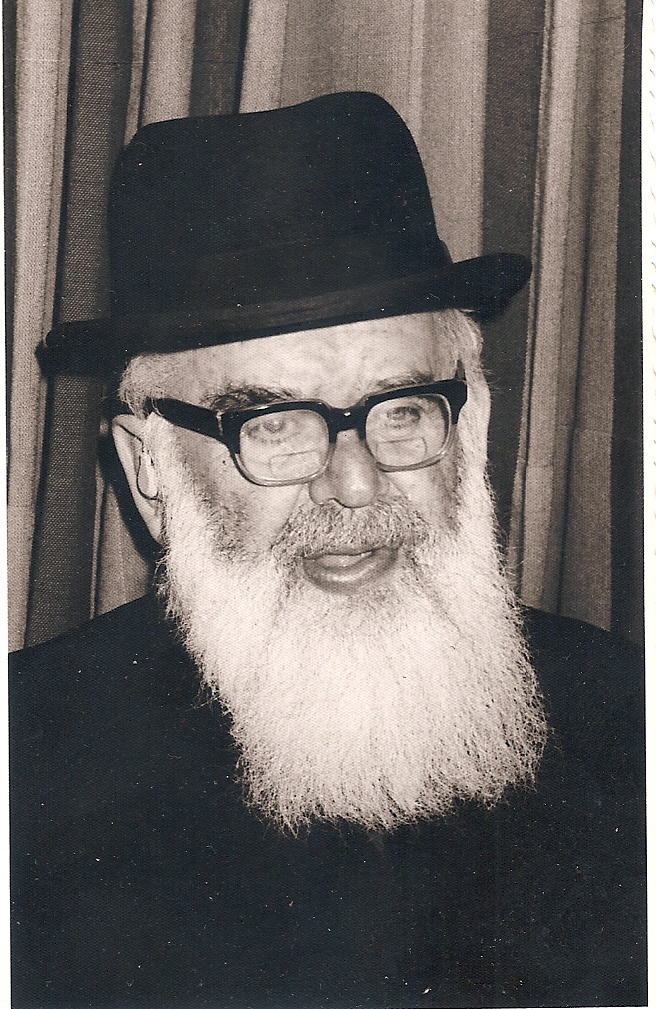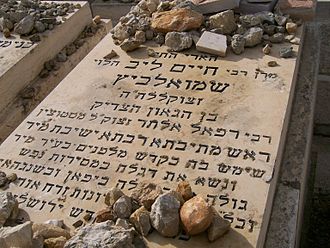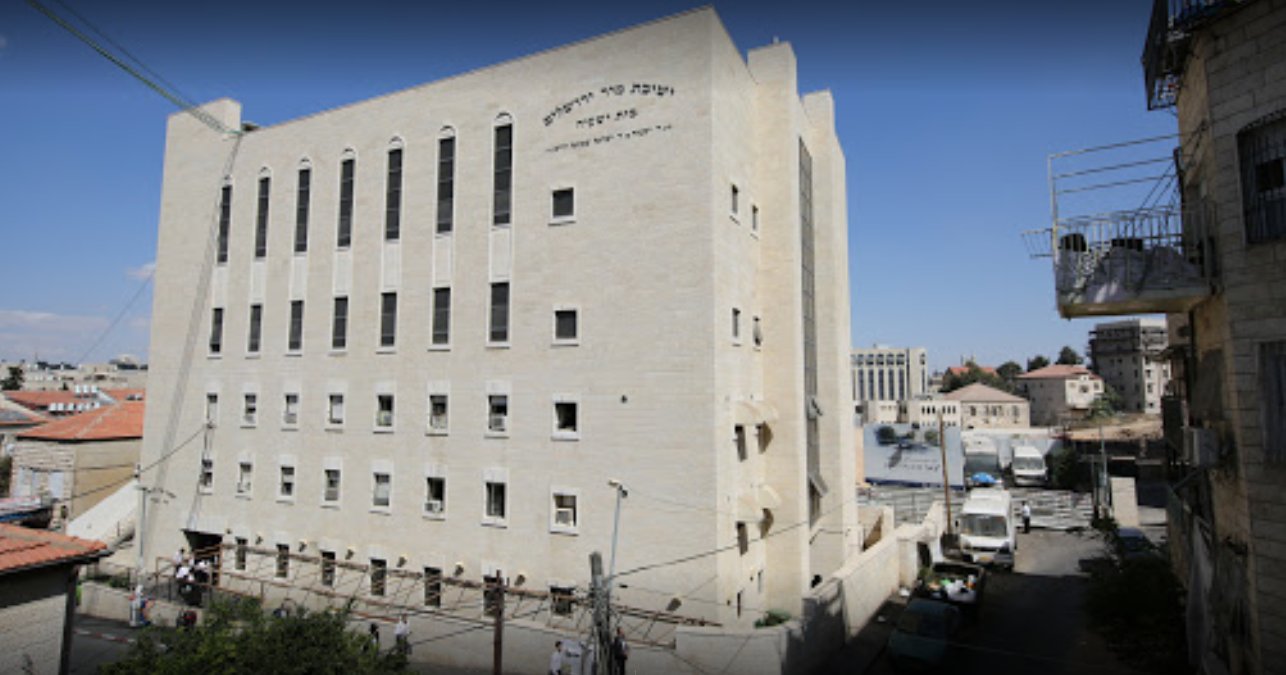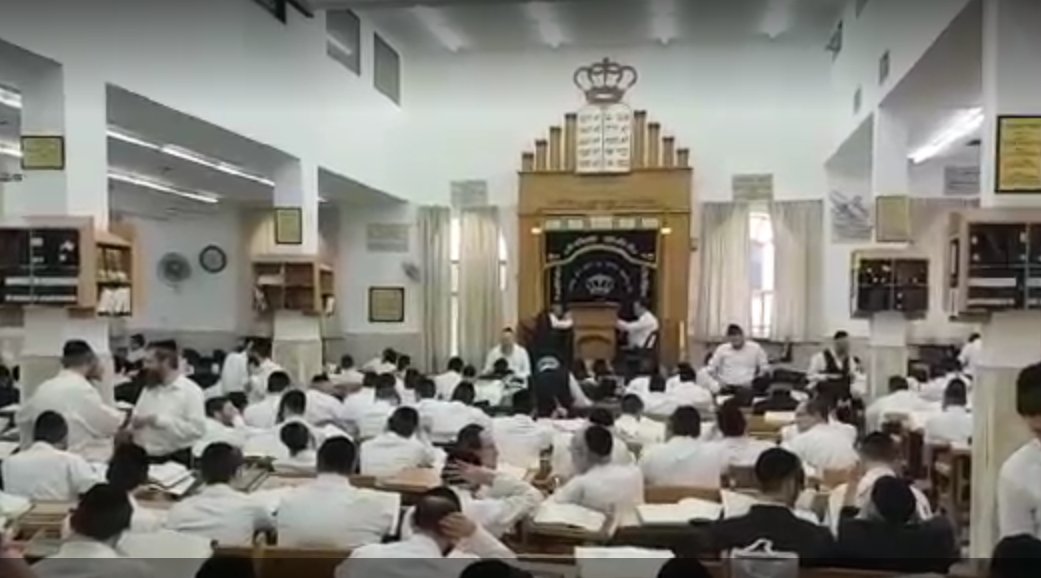| | NEWS
Toras Chaim: R' Chaim Shmuelevitz zt'l-Forty-three Years Since His Passing
Yated Staff

Part III - Conclusion
This extensive appreciation of HaRav Chaim Shmuelevitz zt"l was first published in our English Yated in 5754 (1993-94) at the fifteenth yahrtzeit.
The Importance of Accepting the Authority of Torah Leaders
R' Chaim put great stress upon the need for obedience in attending a Torah scholar and in being subservient, in general, to the directives of the Torah elders and leaders of the generation. He would explain that a person cannot accept the yoke of Torah upon himself and expect to connect with the giving of the Torah at Sinai without accepting its transmission from generation to generation via the Torah leaders and elders.

A person cannot choose to follow his own path in Torah. One who refuses to accept the authority of the gedolim is not included in the community of those who received the Torah. He pointed out the deterioration that takes place with one who divorces himself from the Torah public. "Achiya will build an altar, Chananya will play the lyre and they will all deny [Hashem] and say: We have no portion in the G- d of Israel" (Brochos 63).
Based on this concept, R' Chaim introduced the thought that one's obligation to submit "to the judge who will be in those days" is not from lack of a better choice, that is, it is not because we lack the greater leaders who lived in previous generations, but precisely because we need what our present leaders have to offer. Each generation is given those leaders best suited to guide it along its particular way.
Along this line, he explained the verse, "You have no one but the judge in your days" with an emphasis on the "you," that is, suited for you. Our sages said that were Aharon to exist in the generation of Yehoyada, the latter would supersede him. If he were in the generation of Tzadok, Tzadok would be greater than he (Koheles Rabba).
We do not deny the fact that Aharon HaKohen was greater than those two, but he would not have been as suitable a leader for their generations as they.
He once spoke at a political rally and explained the Agudath Israel platform as opposed to other political circles. When he touched on Poalei Agudath Israel, he summed up the difference succinctly and clearly, "They are good Jews, individually, but they ran away from cheder."

Ruling Halacha Before One's Master
He harshly censured those self-styled experts or `tzadikim' who felt themselves above the leaders of the generation and who would come before them to explain their own approaches.
R' Chaim proved from sources that one who ruled halacha before one's master, that is, set himself up as a greater expert, as it were, would not be forgiven. Nor would his master be considered, "One who caused his neighbor to be punished" (and who is therefore not admitted into Hashem's presence). He explained it from the aspect of one who is defying the position of Torah leadership amongst Jewry. By challenging it, he is actually endangering all of Jewry.
Our sages likened Israel to a bird. Just as a bird cannot fly without wings, so is Israel helpless without its elders. Jewry without leaders is worse off than the gentiles, in the same way that a bird without wings is more helpless than regular, four-footed creatures.
This is why a master is not permitted to overlook or forgive someone who attempts to overrule his authority. It is not a question of personal honor, so, therefore, the rule of, "One whose neighbor is punished through his doing" does not apply. The sinner has undermined the very infrastructure of Klal Yisroel.
After the eighteen curses which Hashem cursed Israel, He was not `satisfied' until He said, "And the youth will be arrogant to the old man." This is the final, telling blow. Nothing is worse.
One Friday evening, before he began his regular talk, his students noticed that he was very overwrought. His very step seemed restless, which was something totally out of character. R' Chaim began with an apology and said, "I will begin with something which was not to be the subject of this evening's talk. This morning, standing at the bus stop, I met an acquaintance who said brusquely, `You are always talking about this and that. Why don't you speak about this topic?' It was a public issue which he wanted me to present according to his way of thinking.
"I don't understand," said R' Chaim, pained. "Even if I don't have the advantage of wisdom, I do have age on my side. How can this Jew come and instruct me what to say and how to present it? These are not tzadikim, but tzaddikim'lach," he said sharply.
A person's greatness is measured according to the responsibility he is willing to assume for his actions, he used to say. And there are gradations in this. One who is not responsible for his acts is not a rational being; one who accepts full responsibility for his acts deserves a royal crown.
The Tosefta in Brochos says that Yehuda deserved royalty for having said, "What benefit shall we gain if we kill our brother and cover up his blood?"
R' Chaim explained this as follows: The brothers sentenced Yosef to death after trying him by law. Yehuda was a partner to the sentence. Why did he suddenly question the wisdom of their decision? We must conclude that he questioned the aspect of hiding the fact, of covering up his blood.
If something was done through due process of halacha, there is no cause to be ashamed of executing the sentence or hiding it. If there is reason not to back up one's actions and take full responsibility for them, then those acts cannot be fully justified.
R' Chaim dwelled on this point during the furor over the heter mamzeirim (giving regular Jewish status to those who were really illegitimate) involving former Chief Rabbi Goren. At the time it was said that a heter had been issued, however its text and halachic grounds were completely withheld from the public. And to this day, those who signed and backed it, have remained a secret, aside from former Chief Rabbi Goren. Since, and as a result of that affair, former Chief Rabbi Goren was ruled by other poskim as, in effect, halachically incompetent, though he has continued to be active.
"If such a heter is halachically valid, why are they ashamed to publicize it? And why are its backers and signers afraid to show themselves? Every halachic ruling should be issued in such a way that it can be posted on any street corner. This evasion of responsibility proves, above all, that the issue has not been fully clarified halachically but is only the product of `compromisers.'"
Mir Yeshiva - Jerusalem 
Nothing Can Be Good About Avoda Zorah
R' Chaim devoted many of his talks to the internal conflicts which arise in the soul of man. He would pack them with quotes and proofs to uphold his points.
Light and darkness reign alternately. Man may attribute great importance to certain things and be very heedful of them, while sinning in things of far greater import.
R' Chaim quoted the Yerushalmi in Brochos which tells of a vineyard watchman who was on the verge of committing adultery. Before committing himself to the act, he stopped to worry about how he would be tovel afterwards. Before he finished that, the chance to sin was lost. It should be noted that the need to be tovel in such a case is only a takana introduced by Ezra.
It is mind boggling to think that this person had no second thoughts about transgressing the prohibition of adultery, which is mentioned with serious punishment in the Torah itself, but was concerned about keeping an ordinance of Ezra! But that is human nature, concluded R' Chaim: man can overlook a devastating downfall yet feel secure in the fact that he is meticulous in lesser things.
Our sages say that when Hashem split the Yam Suf, ethereal visions became available even to a lowly maid. All Israel was able to point with a finger and say, "This is my G-d." Nonetheless, there were Jews who crossed the Sea with idols.
Even on the very day, later, that Heaven sent them bread from above, they were able to worship a Golden Calf. Not only that, but they took some of the manna and brought it as an offering to this false god.
Our sages derived a halacha from this insight into human nature: They said that even if a person spit in the face of an idol and defiled it, it is not considered nullified. This is learned from a verse that says that even when a person curses his king and his god, and his heart is turned upward to heaven, he still looks downward and cannot help but worship the idols.
This is how greatly light and darkness are intermingled. A person may be abusing his idols and turning his heart heavenward, yet at that very moment, he is still strongly bound to those idols.
The main Beis Medrash in Jerusalem

Look At The Whole Picture
R' Chaim would also repeatedly declare that a person cannot be judged from a single act. One positive act does not have the power to grant a person a clean bill, since everyone is in eternal conflict between the forces of evil, alongside the good.
A relative once asked him why the gedolim were so vehemently against a certain group that works around the world to bring Jews closer to their heritage (Lubavitch).
"Despite all the arguments against them, they certainly have a good side to them," he said. He showed R' Chaim a brochure they had published about the extensive kiruv activities which they carried on worldwide. R' Chaim listened patiently, and when the man was finished, waved a hand in errant dismissal. The man persisted; he pointed to the brochure, saying, "Look, they have activities in this outpost and that remote place. How can you ignore all the good they are doing?"
R' Chaim again waved a hand in emphatic dismissal. "When you're talking about avoda zorah, there is no place to seek out the good."
His Background
R' Chaim Leib Shmuelevitz zt'l was born on the second day of Rosh Hashonoh, 5662 (1902), in Stuchin, Poland. He was named after the famed R' Chaim Leib Stavisker zt'l. His father, R' Refoel Alter Shmuelevitz zt'l, served as the rosh yeshiva in Stuchin and his mother, Rebbetzin Ettel, was the daughter of the Alter of Novardok.
It was evident from early youth that he was brilliant as well as diligent. His parents died within the same year, when he was but sixteen, and the burden of the family fell upon his shoulders. Nevertheless, he did not waver from his tenacious study schedule by day and by night. His fame spread far and wide in the yeshiva world of Lithuania and soon `Chaim Stuchiner' was nonpareil.
In 5681, when he was nineteen years old, the rosh yeshiva of Grodno, R' Shimon Shkop, one of the leading roshei yeshiva at the time, took him to say shiurim. During this period, he was already known for his extraordinary diligence. His peers testified that he would sometimes sit engrossed in study for thirty-hour periods.
After several years, he joined a chabura group which relocated to the Mir Yeshiva. Even here, he stood out among the lions, particularly in his rare expertise. He was able to quote verbatim, literally word for word, entire tractates, paragraphs in Shulchan Oruch and works of rishonim and acharonim.
Whenever he `talked in learning,' he would cite dozens of sources on the subject in a most organized, orderly manner. During this time, he enjoyed the attention and affection of the Mir mashgiach, R' Yeruchom Levovitz zt'l, who astounded people by the way he summed him up: "Chaim Stuchiner does not need mussar. He will produce it through his Torah."
He also gained the favor of the rosh yeshiva, R' Eliezer Yehuda Finkel zt'l, who chose him for a son-in-law in 5690.
In 5696, R' Chaim began giving shiurim in Mir and was soon hailed for them. They encompassed all of Shas and were based on quotes and proofs gathered from everywhere. His construction was watertight, with no loopholes or weak spots.
When the Second World War broke out, Yeshivas Mir went into exile, first to Vilna and then to Kaiden. R' Eliezer Yehuda Finkel succeeded in gaining papers for himself to go to Eretz Yisroel and he transferred the leadership of the yeshiva to his son-in-law's capable hands. It was R' Chaim's idea to relocate the yeshiva to the Far East.
They made their way through Europe and Russia up to the northern port of Vladivostok, from where they sailed to Saruga, Japan. Their next stop was Kobe, Japan, and then, Shanghai, China.
The yeshiva students had transit visas good for only ten days, but they remained in China under Japanese rule for five miraculous years. It was evident at every step that Providence was smoothing the way for them, as many books relate. R' Chaim assumed full responsibility for the yeshiva's survival and upkeep, exhibiting phenomenal leadership ability, ingenuity and adaptability in dealing with the material as well as spiritual welfare of his charges.
After the war, the yeshiva left Shanghai in small groups. R' Chaim first went to America, but he remained there for only a short time before going up to Jerusalem to rejoin his father-in-law, R' Eliezer Yehuda Finkel, at Yeshivas Mir in Jerusalem. From a humble beginning, it grew from year to year. When the Rosh Yeshiva passed away in 1965, he became its head and was assisted by his son-in-law, R' Nochum Partzovitz zt'l.
After the passing of his brother-in-law, R' Chaim Zeev Finkel zt'l, who had served as the yeshiva's spiritual administrator, that task was added to R' Chaim's responsibilities, and he began delivering mussar talks in the yeshiva. These were widely acclaimed by all and circulated at large. They included probing insights into the teachings of Chazal. R' Chaim would analyze their sayings from a critical—rather than homiletic—view, and highlight the hidden nuances and lessons in them. His Sichos Mussar have become basic texts for the yeshiva world.
In his latter years, R' Chaim suffered terribly, but in spite of this, he sacrificed himself in order to keep up his shiurim. Even in his final days, when he was in a semiconscious state, it was evident that his mind was still totally engrossed in the world of learning. Lying in his hospital bed, he was informed that his rebbetzin had just lit the Shabbos candles, whereupon he spouted, "Shabbos, twenty-one," which is the place in the gemora which deals with Shabbos candles. Sometimes he could be heard murmuring, "The Rashash is not correct."
When visitors wished him a speedy recovery, he would spontaneously retort from his semiconscious state, "Brengt a ra'aya (bring me proof)..."
The heavenly forces overcame the earthly ones and on the fourth of Teves, 5739, R' Chaim went on to join the heavenly academy. His funeral, attended by over one hundred thousand people, marked an irreplaceable loss. Maran HaRav Shach shlita exclaimed fervently, "Now that R' Chaim is gone, there are no shakdonim [diligent scholars] left."
* * *
R' Chaim's shiurim were circulated only inside the yeshiva, at first, in the form of booklets printed in Mir. But a staff was formed to prepare them for publication.
His essential biography has been immortalized in the Hebrew Moach Volev which was first published as a memorial work by Moriah, and then reissued as an independent work. ArtScroll has also published a biography on R' Chaim.
R' Reuven Grossman zt'l, the gifted author of the Hebrew work, succeeding in presenting R' Chaim's fascinating figure to the general public, and the work was welcomed enthusiastically by a wide readership. R' Reuven was also entrusted with the compilation and editing of his talks. He undertook this massive endeavor but it was interrupted with his tragic death in a car accident ten years ago.
|




